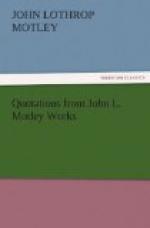Many greedy priests, of lower rank, had turned shop-keepers
Meantime the second civil war in France had broken out
Men were loud in reproof, who had been silent
Mistake to stumble a second time over the same stone
Modern statesmanship, even while it practises, condemns
Monasteries, burned their invaluable libraries
More accustomed to do well than to speak well
More easily, as he had no intention of keeping the promise
Natural to judge only by the result
Necessary to make a virtue of necessity
Neither wished the convocation, while both affected an eagerness
Neither ambitious nor greedy
No qualities whatever but birth and audacity to recommend him
No man could reveal secrets which he did not know
No law but the law of the longest purse
No calumny was too senseless to be invented
No one can testify but a householder
No man ever understood the art of bribery more thoroughly
No authority over an army which they did not pay
Not strong enough to sustain many more such victories
Not to fall asleep in the shade of a peace negotiation
Not for a new doctrine, but for liberty of conscience
Not to let the grass grow under their feet
Not so successful as he was picturesque
Not upon words but upon actions
Not of the stuff of which martyrs are made (Erasmus)
Nothing was so powerful as religious difference
Notre Dame at Antwerp
Nowhere was the persecution of heretics more relentless
Obstinate, of both sexes, to be burned
Of high rank but of lamentably low capacity
Often much tyranny in democracy
Oldenbarneveld; afterwards so illustrious
On the first day four thousand men and women were slaughtered
One-half to Philip and one-half to the Pope and Venice (slaves)
One golden grain of wit into a sheet of infinite platitude
Only kept alive by milk, which he drank from a woman’s breast
Only healthy existence of the French was in a state of war
Orator was, however, delighted with his own performance
Others go to battle, says the historian, these go to war
Our pot had not gone to the fire as often
Panegyrists of royal houses in the sixteenth century
Pardon for crimes already committed, or about to be committed
Pardon for murder, if not by poison, was cheaper
Pathetic dying words of Anne Boleyn
Paying their passage through, purgatory
Peace, in reality, was war in its worst shape
Peace was desirable, it might be more dangerous than war
Perfection of insolence
Perpetually dropping small innuendos like pebbles
Persons who discussed religious matters were to be put to death
Petty passion for contemptible details
Philip, who did not often say a great deal in a few words
Planted the inquisition in the Netherlands
Plundering the country which they came to protect
Poisoning, for example, was absolved for eleven ducats
Pope and emperor maintain both positions with equal
Meantime the second civil war in France had broken out
Men were loud in reproof, who had been silent
Mistake to stumble a second time over the same stone
Modern statesmanship, even while it practises, condemns
Monasteries, burned their invaluable libraries
More accustomed to do well than to speak well
More easily, as he had no intention of keeping the promise
Natural to judge only by the result
Necessary to make a virtue of necessity
Neither wished the convocation, while both affected an eagerness
Neither ambitious nor greedy
No qualities whatever but birth and audacity to recommend him
No man could reveal secrets which he did not know
No law but the law of the longest purse
No calumny was too senseless to be invented
No one can testify but a householder
No man ever understood the art of bribery more thoroughly
No authority over an army which they did not pay
Not strong enough to sustain many more such victories
Not to fall asleep in the shade of a peace negotiation
Not for a new doctrine, but for liberty of conscience
Not to let the grass grow under their feet
Not so successful as he was picturesque
Not upon words but upon actions
Not of the stuff of which martyrs are made (Erasmus)
Nothing was so powerful as religious difference
Notre Dame at Antwerp
Nowhere was the persecution of heretics more relentless
Obstinate, of both sexes, to be burned
Of high rank but of lamentably low capacity
Often much tyranny in democracy
Oldenbarneveld; afterwards so illustrious
On the first day four thousand men and women were slaughtered
One-half to Philip and one-half to the Pope and Venice (slaves)
One golden grain of wit into a sheet of infinite platitude
Only kept alive by milk, which he drank from a woman’s breast
Only healthy existence of the French was in a state of war
Orator was, however, delighted with his own performance
Others go to battle, says the historian, these go to war
Our pot had not gone to the fire as often
Panegyrists of royal houses in the sixteenth century
Pardon for crimes already committed, or about to be committed
Pardon for murder, if not by poison, was cheaper
Pathetic dying words of Anne Boleyn
Paying their passage through, purgatory
Peace, in reality, was war in its worst shape
Peace was desirable, it might be more dangerous than war
Perfection of insolence
Perpetually dropping small innuendos like pebbles
Persons who discussed religious matters were to be put to death
Petty passion for contemptible details
Philip, who did not often say a great deal in a few words
Planted the inquisition in the Netherlands
Plundering the country which they came to protect
Poisoning, for example, was absolved for eleven ducats
Pope and emperor maintain both positions with equal




